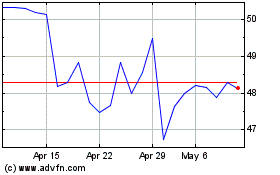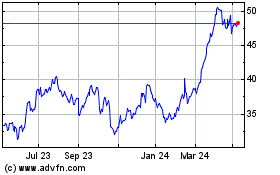Ghosn Lawyers Challenge Court Case -- WSJ
October 25 2019 - 3:02AM
Dow Jones News
By Peter Landers
This article is being republished as part of our daily
reproduction of WSJ.com articles that also appeared in the U.S.
print edition of The Wall Street Journal (October 25, 2019).
TOKYO -- Carlos Ghosn's lawyers asked a Tokyo court to throw out
the criminal case against the former Nissan Motor Co. chairman,
saying prosecutors brought it to help Nissan executives who feared
a French takeover.
In a court filing, defense lawyers laid out for the first time
in detail their theory of why Mr. Ghosn was targeted for
prosecution. They said the Japanese government and Nissan teamed up
to look for potential crimes by the French-educated executive to
prevent him from pursuing plans to link Nissan more tightly to its
alliance partner, Renault SA of France.
"The investigation is itself illegal," said Junichiro Hironaka,
the lawyer leading Mr. Ghosn's defense.
The filing, dated Oct. 17, said prosecutors relied on biased
Nissan executives who were determined to find improprieties by Mr.
Ghosn while casting a blind eye to their own wrongdoing. Mr.
Hironaka said he had evidence of involvement by officials in the
Ministry of Economy, Trade and Industry but declined to release
it.
The Tokyo district prosecutors' office and Nissan declined to
comment. The ministry said the defense's allegations about it are
groundless.
Prosecutors have said their investigation was proper and that
they are confident their charges are accurate. Nissan has said Mr.
Ghosn committed "significant misconduct" while leading the auto
maker. It has said it is fully cooperating with prosecutors.
Mr. Ghosn was arrested Nov. 19. At the time, he was also serving
as Renault's chairman and chief executive.
After spending more than four months in jail in two stints, Mr.
Ghosn was released on April 25 on the condition that he remain in
Japan. He is living in Tokyo, and his lawyer said Mr. Ghosn was
attending all the pretrial hearings in his case. The lawyer said he
has advised Mr. Ghosn not to comment publicly because any
statements could be used against him in court.
Mr. Hironaka said the Tokyo District Court has expressed a
desire to begin the trial by April, but he said that might be
difficult because repeated disputes over evidence have bogged down
the pretrial process.
"There's a whole lot they don't want to show us," he said of
prosecutors.
In the U.S. legal system, federal prosecutors must provide the
defense with any evidence that may point to the defendant's
innocence. Until this century, Japan had no such principle.
A Japanese legal change passed in 2004 expanded the rights of
defendants to seek potentially exculpatory evidence, but the rules
governing the process are undeveloped, Mr. Hironaka said. He
criticized prosecutors for withholding what he said were some 6,000
emails and other electronic documents held by Nissan.
In addition to casting doubt on prosecutors' motives, the
defense filing gives Mr. Ghosn's detailed response to the charges
against him.
He is accused of failing to report more than $80 million in
deferred compensation on Nissan financial statements, sending
Nissan money to a Saudi businessman who had helped him deal with
potential losses on a personal foreign-exchange contract and
diverting Nissan payments to an Oman distributor for his personal
use.
On the compensation issue, the filing said Mr. Ghosn decided to
take a pay cut in 2010 -- when Japan started requiring disclosure
of individual executives' compensation -- because he wanted to
avoid an "uproar based on misconceptions" in Japan. Japanese
executives at big companies traditionally enjoy a
lifetime-employment guarantee but are paid far less than Western
counterparts.
Mr. Ghosn ordered an aide to record in writing each year the
amount he "would have rightfully been able to receive" if he were
paid by global standards and the difference between that amount and
his pay, the defense said.
Prosecutors are expected to use such documents to argue that Mr.
Ghosn was awarding himself deferred compensation each year and
should have reported the money on Nissan's financial statements.
The defense said there was no agreement to pay Mr. Ghosn the amount
he thought he should have earned and that the records were
reference materials for potential future compensation
discussions.
On the Middle East accusations, the defense said Nissan made
payments to its Saudi and Omani distributors for business reasons
and followed company procedures. None of the money went to Mr.
Ghosn or benefited him personally, it said.
Chieko Tsuneoka contributed to this article.
Write to Peter Landers at peter.landers@wsj.com
(END) Dow Jones Newswires
October 25, 2019 02:47 ET (06:47 GMT)
Copyright (c) 2019 Dow Jones & Company, Inc.
Renault (EU:RNO)
Historical Stock Chart
From Mar 2024 to Apr 2024

Renault (EU:RNO)
Historical Stock Chart
From Apr 2023 to Apr 2024
